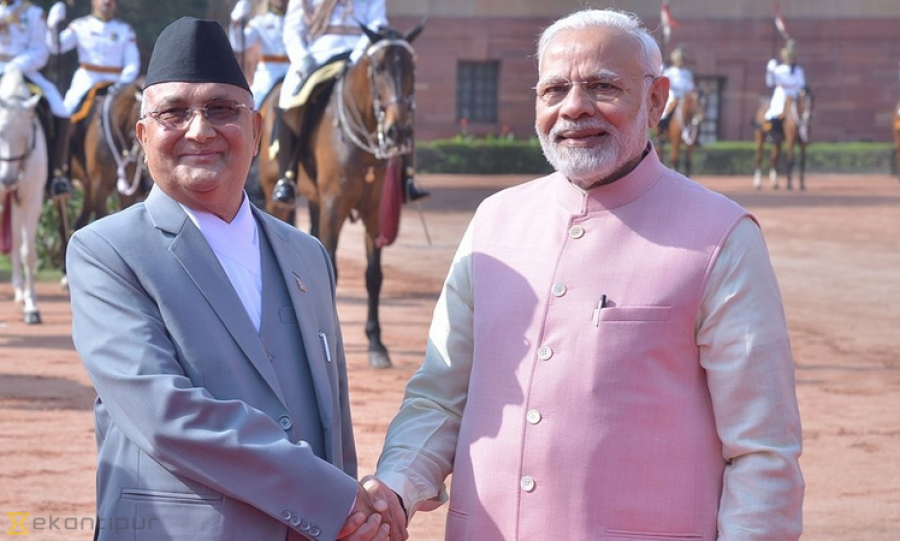Columns
Is this the end of the ‘special relationship’?
Anti-Indianism has fuelled Nepali politics for seven decades. It now needs to decide the future of bilateral ties.
Amish Raj Mulmi
At the very outset, I want to make it clear that like most of us, I am a beneficiary of the ‘special relationship’ between India and Nepal: I have studied and worked in India, my partner is Indian, and I continue to work with Indian authors and companies. Even then, as a former boss likes to tell me, those who don’t live on the border will probably never understand the true mechanisms of what the special relationship means on the ground. For, the India-Nepal border is a complex one, perhaps the most complex of borders in our part of the world. The open border is at the heart of this ‘special relationship’ continually invoked by India, and increasingly rejected by Nepal. And as much as the Twitterati berated the tone of the Hindustan Times editorial that suggested a reset of bilateral ties will have ‘clear costs’ for Nepal, the fact is, Nepali citizens will have to swallow a few bitter pills if bilateral ties between the two are to be revised, notwithstanding whatever implications it has for Indian citizens.
While Nepal has chafed at unequal ties and India’s regional hegemony in the past, the new Kalapani chill is an outcome of the 2015 blockade and Kathmandu straining at Indian micro-management of Nepali politics. You can see strains of anti-Madhes politics tying into anti-Indianism when a parliamentarian is insulted as a ‘bharatiya cheli’. Nepal’s resolve has been toughened because of closer ties with China and the possibilities of economic delinking with India. But while Beijing affords a shield, its limitations in resolving discordant India-Nepal issues was made clear during the Kalapani dispute. Successive Nepali governments have insisted the special relationship cannot exist on India’s terms—a fair enough observation—but Kathmandu has relied on street protests and bitter ripostes (while back-channel talks continue) to convince India to its point of view. Only this time, India has hardened its stance as well.
The eternal paradox of the special relationship is that while it allows freedom of movement across both countries and other extraterritorial and economic benefits, it is also at the heart of Nepal’s anxiety vis-a-vis its sovereignty (one only needs to look at our citizenship laws to be convinced of this). The Kalapani dispute has, as difficult as it is to realise, shown Kathmandu’s limitations in convincing Delhi under Narendra Modi to come to the table, but the intransigence is also an example of what happens when foreign policy gets overtaken by politicians with partisan interests and harsh words from both sides. As our ambassador in Delhi has said, back-channel talks have continued with the Indian establishment unlike it has been made out in Kathmandu. Unfortunately, anti-Indianism is the flavour of the month, and the ambassador’s comments will disappear under the flurry of nationalist rhetoric.
It has become increasingly clear that Nepal wants out of the ‘special relationship’, even if it hasn’t come out and said it openly. It has stopped invoking the term even though India continuously does; there is certain posturing against Delhi from this government that is reminiscent of its electoral victory on the plank of nationalism, and Kathmandu has been blaming Delhi for not agreeing to talks. But if the special relationship is to go, what would be the outcome?
The first effect would be on the freedom of movement between the two countries. Nepalis will no longer be able to work or study in India without a visa, and Indians cannot do so in Nepal. It will also mean the Gorkha regiments will have to be disbanded; the regiments serve in the Indian Army (and the British) on the basis of a tripartite agreement made as the British left India, and is at the heart of what makes India-Nepal ties special. It will mean an end to any existing preferential trade and economic relations between the two countries. And it will mean ending the fixed exchange rate system. The implications on the border aren’t discussed here, but surely the effects will be felt more intensely by border citizens. And there will be the accompanying rethinking of security and diplomatic ties.
All of this is perfectly okay—after all, this is how normal bilateral ties are conducted. The question before Kathmandu, therefore, is whether it is ready to escape the special relationship.
Nepal’s predicament to ensure absolute sovereignty while retaining the status quo on other implications of the existent relationship is not new. The current issue isn’t a one-off either; almost every decade since 1950 has seen serious strains that have slowly eroded away India’s influence in Nepal. But there was more leeway in the past from both sides, and there were also better-placed interlocutors who could defuse tensions between the two. What has changed this time around is that the Narendra Modi government does not have any legacy ties to Nepal, unlike past Indian governments. And, already bruised from its ill-placed policy actions in 2015, it seems determined to not reciprocate the way Kathmandu wants. There is also a hardening from the Indian government that was not noticed in the past; already there are indications India, too, is thinking about a reset in ties. Indian commentators would earlier call for specific policy revisions while retaining the special relationship, but this time around, a series of articles have asked for existing ties to be reset. That leads one to think, perhaps Delhi too wants the special relationship to be revisited.
It’s easy to raise a storm on social media and say Nepali pride will allow us to face anything as long as our sovereignty is not compromised, but the truth of the matter is rather more delicate. Ask the nearly 750,000 Nepalis who have returned from India during the lockdown (and one knows there are more Nepalis in India still), or for whom the open border is a lifeline. But if Nepal is clear it wants to replace existing ties with a new normal, it has to think beyond immediate political gain and chest-thumping. It cannot expect Delhi to accede to the status quo while it argues against the special relationship. Anti-Indianism has fuelled Nepali politics for seven decades; it now needs to decide the future of bilateral ties.




 8.22°C Kathmandu
8.22°C Kathmandu















